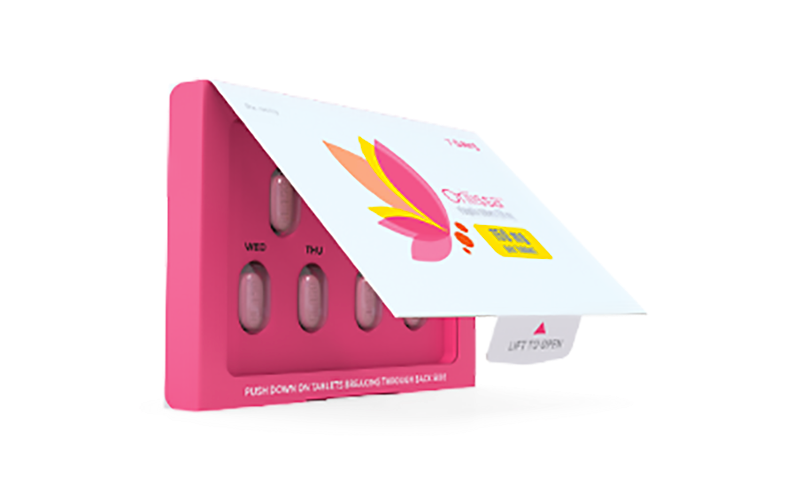ORILISSA is a pill that’s clinically proven to relieve moderate to severe endometriosis pain

It’s different—it’s not a painkiller, injection, surgery, or birth control. And, it does not contain hormones.
ORILISSA was proven to reduce:
- Painful periods: gynecologists call this dysmenorrhea (DIS-men-uh-REE-uh).
- Pelvic pain in between periods: gynecologists call this non-menstrual pelvic pain.
- Pain with sex*: gynecologists call this dyspareunia (DIS-puh-ROO-nee-uh).
*There are 2 different doses of ORILISSA: 150 mg (taken once a day) or 200 mg (taken twice a day). Only the 200 mg dose was proven to work for pain with sex.
Make an appointment today and ask your gynecologist if ORILISSA could be right for you.
USE
ORILISSA® (elagolix) is a prescription medicine used to treat moderate to severe pain associated with endometriosis. It is not known if ORILISSA is safe and effective in children under 18 years of age.

What is the most important information I should know about ORILISSA?
ORILISSA may cause serious side effects, including bone loss and effects on pregnancy:
- Bone Loss (decreased Bone Mineral Density [BMD])
While you are taking ORILISSA, your estrogen levels will be low. This can lead to BMD loss. Your BMD may improve after stopping ORILISSA, but may not recover completely. It is unknown if these bone changes could increase your risk for broken bones as you age. Your healthcare provider (HCP) may order a DXA scan to check your BMD. - Effects on Pregnancy
Do not take ORILISSA if you are trying to become or are pregnant, as your risk for early pregnancy loss may increase. If you think you are pregnant, stop taking ORILISSA right away and call your HCP. ORILISSA may change your menstrual periods (irregular bleeding or spotting, a decrease in menstrual bleeding, or no bleeding at all), making it hard to know if you are pregnant. Watch for other signs of pregnancy, such as breast tenderness, weight gain, and nausea. ORILISSA does not prevent pregnancy. You will need to use effective hormone-free birth control (such as condoms or spermicide) while taking ORILISSA and for one week after stopping ORILISSA. Birth control pills that contain estrogen may make ORILISSA less effective. It is unknown how well ORILISSA works while on progestin-only birth control.
Do not take ORILISSA if you:
- Are or may be pregnant, have osteoporosis, have severe liver disease, or take medicines known as strong OATP1B1 inhibitors, such as cyclosporine or gemfibrozil. If you are unsure if you are taking one of these medicines, ask your HCP.
What should I tell my HCP before taking ORILISSA?
Tell your HCP about all of your medical conditions, including if you:
- Have or have had broken bones, have other conditions, or take medicines that may cause bone problems; have or have had depression, mood problems, or suicidal thoughts or behavior; have liver problems; think you may be pregnant; or are breastfeeding or plan to be. It is unknown if ORILISSA passes into breast milk. Talk to your HCP about the best way to feed your baby if you take ORILISSA.
Tell your HCP about all of the medicines you take, including prescription and over-the-counter medicines, vitamins, and herbal supplements.
Especially tell your HCP if you take birth control pills. Your HCP may advise you to change the pills you take or your method of birth control.
What are the possible side effects of ORILISSA?
ORILISSA can cause serious side effects including:
- Suicidal thoughts, actions, or behavior, and worsening of mood. Call your HCP right away, or call 911 if an emergency, if you have any of these symptoms, especially if they are new, worse, or bother you: thoughts about suicide or dying, try to commit suicide, new or worse depression or anxiety, or other unusual changes in behavior or mood. You or your caregiver should pay attention to any changes, especially sudden changes in your mood, behaviors, thoughts, or feelings.
- Abnormal liver tests. Call your HCP right away if you have any of these signs and symptoms of liver problems: yellowing of the skin or the whites of the eyes (jaundice), dark amber-colored urine, feeling tired, nausea and vomiting, generalized swelling, right upper stomach area pain, or bruising easily.
The most common side effects of ORILISSA include: hot flashes or night sweats, headache, nausea, difficulty sleeping, absence of periods, anxiety, joint pain, depression, and mood changes.
These are not all of the possible side effects of ORILISSA. This is the most important information to know about ORILISSA. For more information, talk to your doctor or HCP.
Take ORILISSA exactly as your HCP tells you. Tell your HCP if you have any side effect that bothers you or that does not go away. Call your HCP for medical advice about side effects.
You are encouraged to report negative side effects of prescription drugs to the FDA. Visit www.fda.gov/medwatch or call 1-800-FDA-1088.
If you are having difficulty paying for your medicine, AbbVie may be able to help. Visit AbbVie.com/myAbbVieAssist to learn more.

